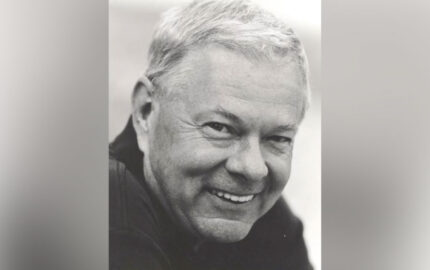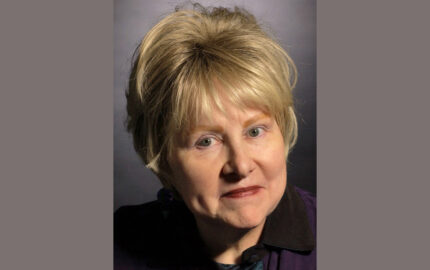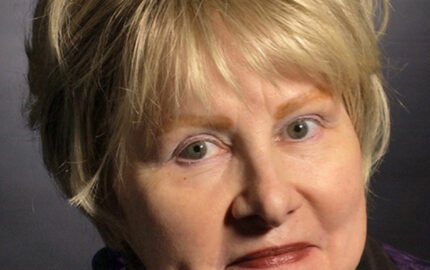When my younger daughter was 6 years old, Bob Maynard came to dinner at our house in Des Moines. We sat for a long time at the table, as old friends do, and when I finally put Nell to bed, she told me, “Mommy, Mr. Maynard has the voice of God.”
Dori's dad had that kind of voice, and presence, and authority. He was the pioneer for diversity and justice in journalism. After Bob died at 56 (exactly the same, way-too-early age at which Dori left us on February 24th), Dori carried on his work. Like him, she was brave, wise, funny, and rock-solid dedicated.
And I think her job was even harder than her father's.
When she took on the mantle, a great many people—even the sort who would have acknowledged the need for Bob's efforts—wanted to believe the work was done, the conversation over. So Dori woke up every morning knowing that, whether among friends or among Neanderthals, she'd be spending her day finding the most gracious way to say what had to be said that nobody wanted to hear. She was gentle, but her dedication was fierce. Hour by hour, year after year, she sought to make visible to us, her blindfolded colleagues, how very much damage we were doing by writing as if we could see.
[sidebar head="Remembering Dori Maynard" style="right" id="remembrances"]Dori J. Maynard Believed 'Journalism and Life Demand All Voices'
By Mary C. Curtis, NF '06
Dori Maynard helped 'to make race and diversity a greater part of the national dialogue'
By Frank O. Sotomayor, NF '86
Farewell Dori J. Maynard. And thank you.
By Latoya Peterson, Fusion
For Dori Maynard, diversity in journalism just made sense
By Brenda Payton, Oakland Tribune
What I wish I would have told Dori Maynard in our last conversation
By S. Mitra Kalita, Poynter Mediawire
[/sidebar]
Dori knew a lot about “otherness.” She was a woman in a macho biz, an African American who spent much of her time in a mostly white world, and Jewish to boot (on her mother's side). She knew well that “otherness” is in the eye of the observer, and she knew how much it distorts our vision. Yet somehow, amid the ongoing pain and frustration of this knowledge, she persisted in keeping her heart open. Put that together with the richness of her life experience, and she was unbeatable at helping people who thought they were the norm see that there are all these other norms. She was simply terrific at helping us realize that the only way to live—certainly the only way accurately to describe life, which is what journalists do—is to understand that those other norms are “normal.”
Dori herself was so many “others,” so beautifully integrated, that she determinedly saw the possibility of change in almost everyone. She saw clearly the pain of the injustices we journalists perpetrate, yet never failed to extend to us, in turn, the justice of believing we would do the right thing if only we could see it.
And she did everything she could to help us see it.
I knew how much Dori loved journalism and how much she loved justice. Still, given that her work meant constant grappling with the cruelty wrought through journalistic thoughtlessness, I sometimes wondered how she could stick with it. So I'd ask her. And she'd say, with a wry, crooked smile, “What else are you gonna do?”
Now I see the deep, deep sadness at her death and the huge celebration of her achievements. And I think Dori would have been powerfully moved by this evidence of how many people she reached. But after enjoying that feeling for a while, Dori would no doubt think to herself: “What else are they gonna do?” And we know that the answer needs to be: Everything we can, hour by hour, year after year, just like Dori did. Even if it's really hard and we can't do it one umpteenth as well.
Dori's dad had that kind of voice, and presence, and authority. He was the pioneer for diversity and justice in journalism. After Bob died at 56 (exactly the same, way-too-early age at which Dori left us on February 24th), Dori carried on his work. Like him, she was brave, wise, funny, and rock-solid dedicated.
And I think her job was even harder than her father's.
When she took on the mantle, a great many people—even the sort who would have acknowledged the need for Bob's efforts—wanted to believe the work was done, the conversation over. So Dori woke up every morning knowing that, whether among friends or among Neanderthals, she'd be spending her day finding the most gracious way to say what had to be said that nobody wanted to hear. She was gentle, but her dedication was fierce. Hour by hour, year after year, she sought to make visible to us, her blindfolded colleagues, how very much damage we were doing by writing as if we could see.
[sidebar head="Remembering Dori Maynard" style="right" id="remembrances"]Dori J. Maynard Believed 'Journalism and Life Demand All Voices'
By Mary C. Curtis, NF '06
Dori Maynard helped 'to make race and diversity a greater part of the national dialogue'
By Frank O. Sotomayor, NF '86
Farewell Dori J. Maynard. And thank you.
By Latoya Peterson, Fusion
For Dori Maynard, diversity in journalism just made sense
By Brenda Payton, Oakland Tribune
What I wish I would have told Dori Maynard in our last conversation
By S. Mitra Kalita, Poynter Mediawire
[/sidebar]
Dori knew a lot about “otherness.” She was a woman in a macho biz, an African American who spent much of her time in a mostly white world, and Jewish to boot (on her mother's side). She knew well that “otherness” is in the eye of the observer, and she knew how much it distorts our vision. Yet somehow, amid the ongoing pain and frustration of this knowledge, she persisted in keeping her heart open. Put that together with the richness of her life experience, and she was unbeatable at helping people who thought they were the norm see that there are all these other norms. She was simply terrific at helping us realize that the only way to live—certainly the only way accurately to describe life, which is what journalists do—is to understand that those other norms are “normal.”
Dori herself was so many “others,” so beautifully integrated, that she determinedly saw the possibility of change in almost everyone. She saw clearly the pain of the injustices we journalists perpetrate, yet never failed to extend to us, in turn, the justice of believing we would do the right thing if only we could see it.
And she did everything she could to help us see it.
I knew how much Dori loved journalism and how much she loved justice. Still, given that her work meant constant grappling with the cruelty wrought through journalistic thoughtlessness, I sometimes wondered how she could stick with it. So I'd ask her. And she'd say, with a wry, crooked smile, “What else are you gonna do?”
Now I see the deep, deep sadness at her death and the huge celebration of her achievements. And I think Dori would have been powerfully moved by this evidence of how many people she reached. But after enjoying that feeling for a while, Dori would no doubt think to herself: “What else are they gonna do?” And we know that the answer needs to be: Everything we can, hour by hour, year after year, just like Dori did. Even if it's really hard and we can't do it one umpteenth as well.



